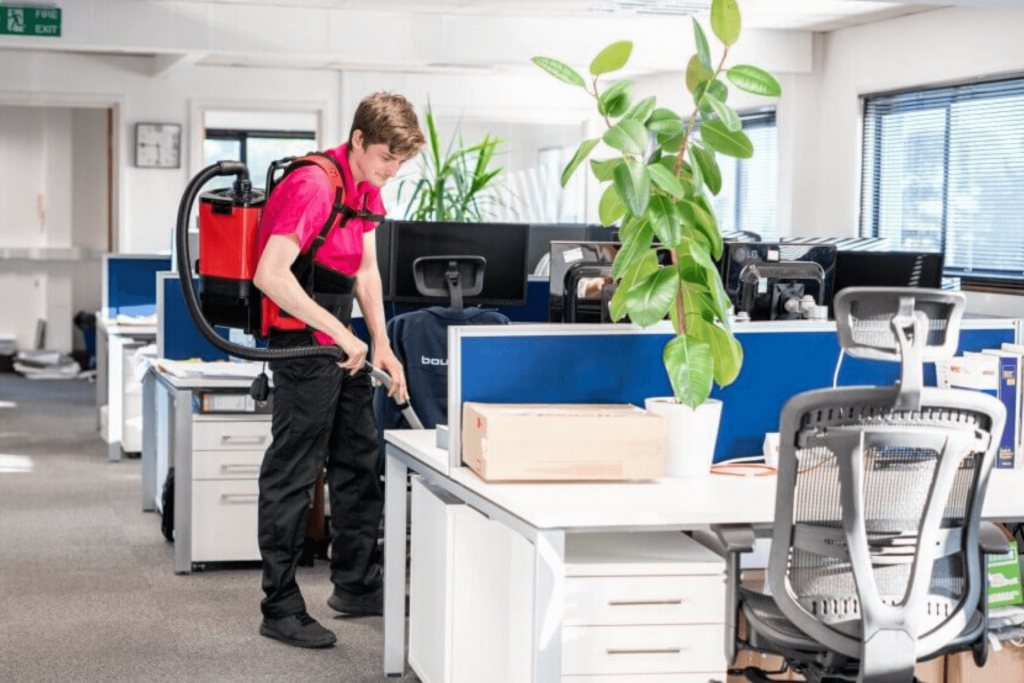By Matt Ellis

With vaccination rates increasing and fear subsiding, people are returning to office buildings to resume working in shared, collaborative spaces. Building owners and managers must not only comply with local and state regulations for clean, safe occupancy, they must also ensure tenants and employees feel comfortable resuming their office life. That means they need to trust their building service partner.
In a recent survey from Clean Link, two-thirds of respondents said they wanted their workplace cleaned and sanitized daily. In the same survey, three in four respondents said they might ask to work from home if they didn’t think their employer was taking sanitizing seriously.
AffinEco Vice President Nolan Macario, who runs the company’s Boston office, said his customers have been asking to have office spaces fully disinfected before welcoming employees back to work. AffinEco created a Post-Pandemic Cleaning Plan to help reduce the risk of spread of coronavirus from employee and visitor contact with contaminated surfaces.
The plan identifies two courses of action for janitors and porters to follow. The first is enhanced routine cleaning, targeting high-touch and high traffic areas on a regular basis by treating surfaces with disinfectant. The second is disinfection of exposed areas in the event a person infected with coronavirus has been on the premises. Once that occurs, AffinEco crews will restrict access to the areas occupied by the infected person for at least 24 hours after their departure and then conduct deep cleaning and disinfection.
“We are going beyond the standard steps to cleanliness, taking a comprehensive approach to disinfection and stopping the spread of pathogens,” Macario said. “Our customers are confident we can maintain a safe working environment because we have the knowledge, the experience and all the tools we need to get the job done.”
The Post-Pandemic Cleaning Plan describes four elements of a successful plan to reopen offices and public spaces in a commercial building:
- Disinfecting high-touch surfaces using EPA-registered disinfectant and disposable dry wipes;
- ATP Testing to quickly assess the cleanliness of surfaces. This rapid testing method is ideal for highly susceptible populations;
- Partnering with customers to order and deliver products and supplies that help prevent infection spread
- Electrostatic spraying to enable superior disinfecting in all hard to reach places
Prior to the pandemic, AffinEco employed a handful of electrostatic sprayers primarily for occasional deep cleaning, or to blunt the effects of a harsh flu season. Electrostatic sprayers create negatively charged cleaning atoms that adhere to all hard, non-porous surfaces where viruses, like COVID-19, can last for days. Because the disinfectant is atomized, it reaches every surface – even underneath tabletops – essentially enveloping the virus with disinfectant. Last year, even before coronavirus began spreading across the country, AffinEco sourced several new electrostatic sprayers – along with ample supplies of personal protective equipment – so the company could immediately meet the needs of its customers at a time of extreme uncertainty.
“Whenever there is a positive case of COVID-19 reported, we go in and use the electrostatic sprayers to disinfect the entire area, making it safe for all workers and tenants,” Macario said.
“The building managers we work with are all trying to promote a culture of confidence and collaboration by guaranteeing an environment that is super clean,” said AffinEco Managing Partner Michael Diamond. “Our job is to make sure they live up to the promise by doing whatever we can to maintain safe, healthy buildings.”
In many cases, Macario said, building managers are requesting additional day porters to continually wipe down common areas of the building, so employees and visitors have a constant reminder that their building is clean and safe.
—
